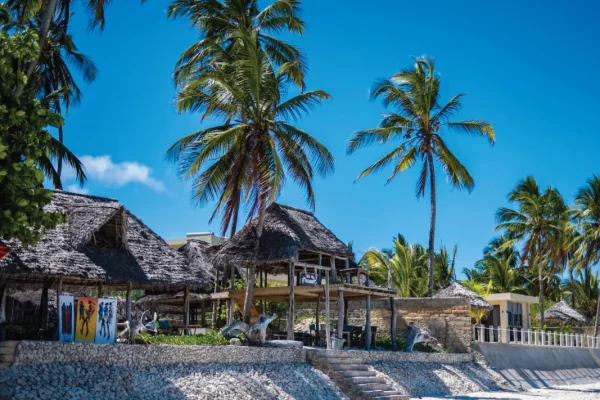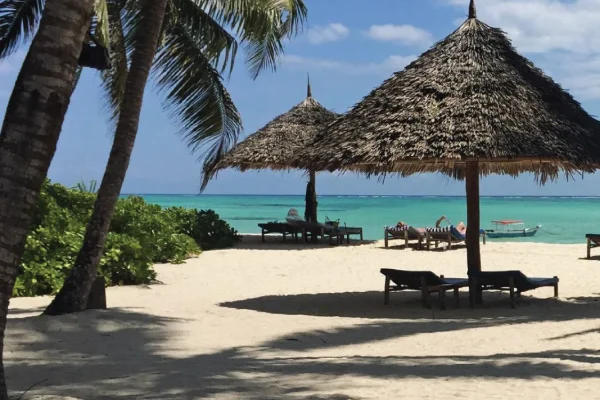ZANZIBAR – Where the Spice of Life Meets Paradise
- BUZZAAR
-
Aug 31
- Share post

Nestled in the turquoise waters of the Indian Ocean, just off the coast of Tanzania, lies Zanzibar – an exotic archipelago that has remained a well-kept secret among seasoned travelers. While it has long served as a cultural and commercial crossroads, Zanzibar is now rising as one of Africa’s most enchanting and luxurious travel destinations – particularly attractive to visitors from the GCC region seeking something beyond the ordinary. From its white-sand beaches and spice plantations to its historic Stone Town and thriving marine life, Zanzibar offers a sensory journey that’s both tranquil and invigorating.
The Allure of the Archipelago
Zanzibar is not just a destination; it’s a state of mind. The mere name evokes images of tropical bliss, winding spice-scented alleys, and swaying palms under coral-orange sunsets. Its unique cultural heritage – a blend of African, Arab, Persian, and European influences – gives Zanzibar a character that’s both ancient and refreshingly modern. And for those who seek more than just another beach holiday, Zanzibar serves up a deeply immersive experience: from barefoot luxury to soul-stirring culture.
For GCC residents – often seeking cooler getaways during the scorching summer or long weekends – Zanzibar provides an ideal escape. It’s just a few hours by flight from major cities like Dubai, Doha, and Muscat. Visa requirements are relatively relaxed for most GCC nationals and residents, and a variety of direct and connecting flights now make travel easier than ever.
Why Zanzibar? A Destination with Many Faces
- Unparalleled Natural Beauty
Whether you are a luxury seeker, nature lover, or wellness traveler, Zanzibar checks every box. The beaches are postcard-perfect – think powdery white sand, transparent waters, and calm tides. Nungwi and Kendwa on the northern coast are favorites among travelers for their pristine conditions and dazzling sunsets.
The eastern shores, including Paje and Jambiani, are renowned for their kitesurfing culture and boho-chic resorts. The calm southern stretches like Kizimkazi are ideal for dolphin-spotting and those looking for peace and seclusion.
- Cultural Fusion at Its Best
One of the most enriching aspects of Zanzibar is its melting pot of cultures. Stone Town, a UNESCO World Heritage site, is an atmospheric maze of narrow alleys, historic mosques, bustling bazaars, and grand Arabian-style houses. It’s a living museum where the past meets the present. The Omani influence, in particular, is strong – from architecture to cuisine – a reminder of the centuries-old maritime trade that connected Muscat to Zanzibar.
GCC travelers often find a nostalgic connection here, with familiar aromas of cardamom, clove, and saffron wafting through the air. The call to prayer echoing from centuries-old minarets overlaid with Indian Ocean waves can feel both foreign and familiar.
- The Spice of Life – Literally
Zanzibar is often referred to as the ‘Spice Island,’ and for good reason. The island’s interior is dotted with spice farms where cloves, vanilla, cinnamon, nutmeg, and pepper flourish in fertile soils. A spice tour isn’t just a tourist gimmick – it’s a fascinating insight into the island’s history as a major spice exporter and its deep connection to the culinary cultures of Arabia and India.
Visitors can walk through lush plantations, learn how each spice is cultivated, and enjoy traditional Swahili meals infused with the very flavors they’ve just seen harvested.
When to Visit?
Zanzibar’s tropical climate makes it a year-round destination, but certain periods are more favorable than others:
- June to October: This is the dry season and arguably the best time to visit. Temperatures are pleasant, skies are clear, and humidity is low – perfect for beach lounging or exploring Stone Town.
- December to February: A warm period with little rainfall. Great for water sports and diving.
- April and May: The long rains make this season less ideal for travel, although the island is lush and serene during this time, and accommodations are more affordable.
For GCC tourists looking to escape summer heat from June to August, or for holiday breaks in December or Eid, Zanzibar is perfectly timed.

GCC Investment and Travel Trends
Interestingly, Zanzibar is not just luring tourists – it’s catching the attention of investors and developers from the GCC. The launch of high-end beachfront developments and boutique resorts has attracted interest from Dubai and Doha-based investors. Some resorts even offer fractional ownership or timeshare models, giving GCC nationals and residents a second home in paradise.
Additionally, wellness retreats, halal travel packages, and family-friendly resorts are on the rise – directly targeting affluent Gulf travelers. The government of Tanzania has streamlined processes to welcome more Middle Eastern investment, including visa-on-arrival policies and tax incentives for developers.
A Taste of Zanzibar – The Island’s Cuisine
Zanzibar’s cuisine is an aromatic adventure – a spicy symphony shaped by African, Arab, Persian, and Indian flavors. You’ll find dishes like Zanzibar biryani, pweza wa nazi (octopus in coconut milk), and fresh grilled seafood straight from the ocean. Street food at Forodhani Gardens in Stone Town is a must-try experience, with vendors grilling everything from sugarcane skewers to the famous Zanzibar pizza (a savory-sweet crepe-like dish with meat, eggs, and chili).
Muslim travelers from the GCC will feel at home, as the island’s population is predominantly Muslim, ensuring that halal food is available almost everywhere.
Must-Do Experiences
- Sunset Dhow Cruise: Sail the Indian Ocean aboard a traditional dhow, sipping fresh juice or coconut water while watching the sun dip beneath the horizon.
- Jozani Forest: Meet the rare Red Colobus monkey and walk through ancient mangroves in the island’s only national park.
- Snorkeling and Diving in Mnemba Atoll: One of East Africa’s most renowned diving spots with coral reefs, sea turtles, and playful dolphins.
- Visit Prison Island: A short boat ride from Stone Town, home to giant tortoises and a somber historical site once used for slave trade.
- Spa & Wellness Retreats: Unwind at one of Zanzibar’s world-class spas offering traditional Swahili treatments, massages with locally sourced oils, and yoga sessions on open decks overlooking the sea.
Practical Tips for GCC Travelers
- Dress modestly in public areas, especially in Stone Town and local villages. Swimwear is fine at resorts and beaches.
- Currency: Tanzanian Shilling (TZS) is the local currency, but USD is widely accepted.
- Language: Swahili is the local language, but English is spoken in all tourist areas. Arabic is also understood in parts of the island.
- Connectivity: Most luxury resorts offer Wi-Fi, but it’s good to buy a local SIM card for better mobile coverage.
Final Word: Zanzibar Is More Than a Destination
Zanzibar is an experience that seduces the senses and nourishes the soul. It’s where nature meets culture, and where luxury coexists with authenticity. For the GCC traveler – weary of over-commercialized destinations and yearning for a place with soul, story, and scenery – Zanzibar is the answer.
It’s a place where the spice of life meets paradise – and leaves you wanting to return, again and again.

